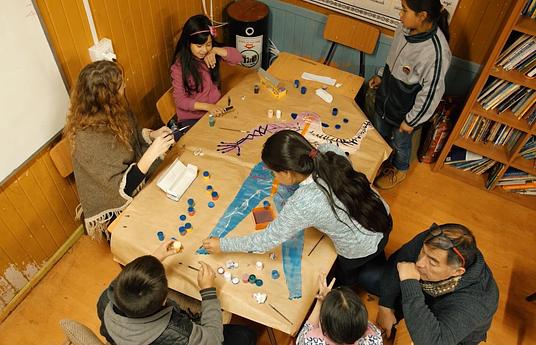Cities for Children initially launched this as a response to school closures in COVID-19, to support learning and wellbeing for disadvantaged children, facing high stress. It was powerful in supporting school readiness and foundational skills for Little Partners (younger children), and building key socioemotional skills and resilience for Big Partners (older children) without digital access.
We establish strong partnerships with formal and informal schools, building buy-in and training teachers from selected grades to support implementation.
Following a Child to Child model, we train Big Partners aged 10-12 years to lead creative learning sessions for groups of up to five Little Partners aged 3-5 years, at the preschool level. They are supported on a weekly basis to deliver a set of curated sessions including literacy, numeracy, socioemotional learning (SEL) and experiential science content. Our playful learning ethos means emphasis on art, games, poems and storytelling. Montessori-inspired sessions and sensory activities help scaffold learning for the younger children, while older children make gains in SEL domains like confidence, empathy, leadership and agency.
Baseline, endline, and ongoing monitoring, evaluation and learning (MEL) activities including weekly reflections by Big Partners help us adjust in real-time, as well as capture impact.
It was first delivered with 1,000 children in open air spaces in informal settlements, following COVID-19. To date, it has reached over 4,200 Little and Big Partners in diverse contexts, including urban community schools; a rural girls’ school; and most recently, 10 girls’ government schools in Pakistan. It is currently being tailored to support out-of-school children, drawing them towards learning. It is also being implemented with a secondary School of Sanctuary for refugee boys and primary school in London.
Scaling the innovation relies on partnerships, with schools as vital collaborators. We constantly seek synergies, tailoring the core programme to work across contexts. With Malala Fund support, our new links with government represent fresh opportunities to scale up and scale out.
Please get in touch to adapt the programme for your context. We curate content from our session plans to align with local curricula and children’s learning levels. It is crucial to have buy-in from school management and teachers for implementation. When sessions are in the timetable, both teachers and Big Partners need to be regularly supported to maximise academic, SEL and wellbeing outcomes.


